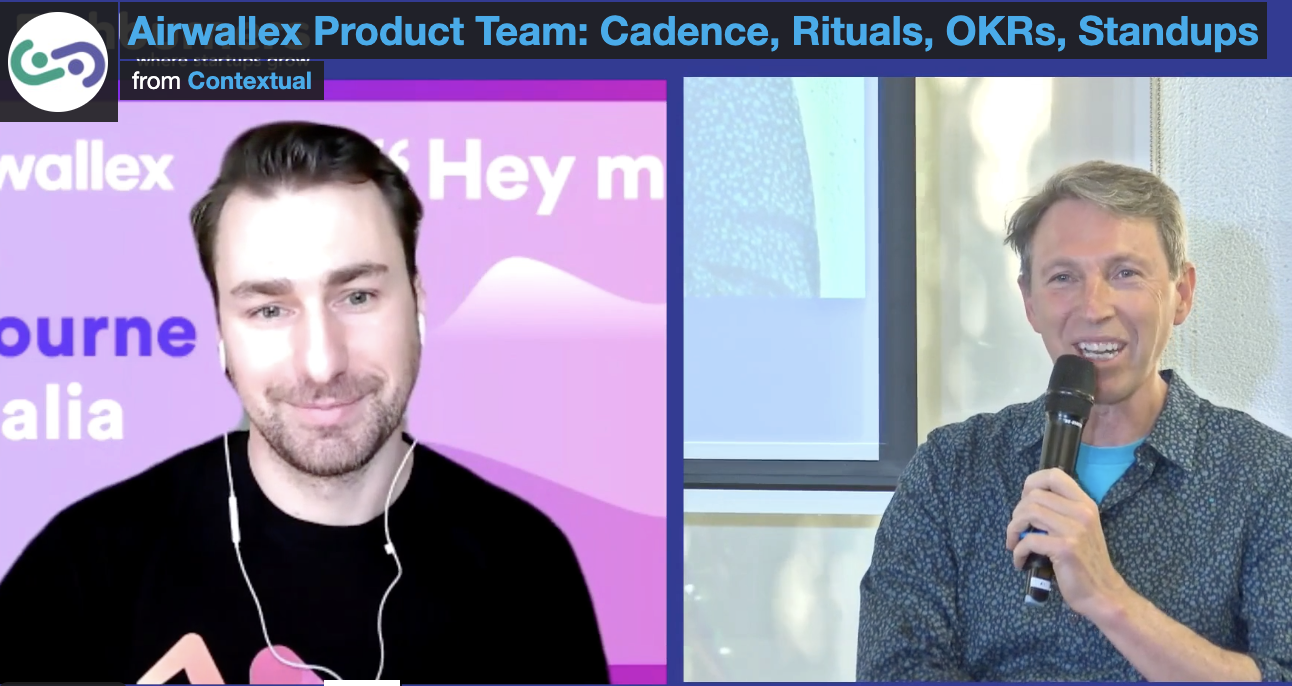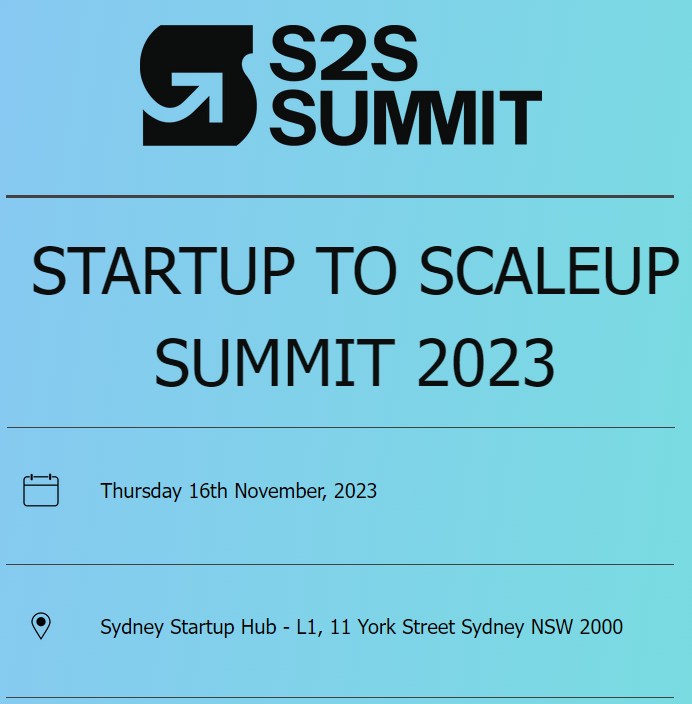In this video, I discover that our team is the only one in the room NOT doing daily standups!
Seriously, Richard explains the disciplines they use in a remote WFH world (Melbourne was locked down hard, hard, hard at the time of recording). So we discuss some of the challenges they have in executing on the OKRs.
You can get this on Soundcloud or see all our podcast links here.
The summary is:
- Airwallex form “squads” that are spear-headed with Product Manager, Designer and Lead Engineer
- There is an over-arching SME strategy.
- Quarterly and Annual OKRs trickle down through the organisation.
- opportunity decision trees (Teresa Torres, see Opportunity Solution Trees for Product Teams to ideate potential solutions to OKRs”
- Triaging of solutions (see Don’t build shiny objects)
- Monday planning meetings – where broader goals for the week within sprints are agreed
- Daily standups (!)
Transcript
David: but what’s what’s your approach today: how does one
squad really work? What’s the
what’s the way you attack things? Is it okrs? Is it JTBD? (“jobs to be done”). How do
you get things into sprints etc
Richard: OK, so in terms of how we make decisions and work.
So quarterly OKRs are used to govern essentially the outcomes that the team is shooting towards.
Those OKRs ladder to our to our SME strategy so we’ve got our SME strategy.
We start with. We then develop OKRs on a quarterly basis and an annual basis that
strategy and then what the team does is identifies the opportunities they think are best placed to move those OKRs and essentially that then eventually translates to a bunch features they (the squad) want to deliver
we then run a a fortnightly um
a fortnite cadence which is essentially
about
which includes a bunch of rituals a
planning meeting
a showcase it’s got uh some weekly
planning
to segment that up and and daily
stand-ups
okay so just ritual is that a product
product word or is that an air will x
word or is that a secret
just a ritual
it’s a rich word is it maybe it’s a rich
word but we have these yeah we have a
set of meetings that essentially
derive that fortnightly cadence and that
fortnightly cadence
essentially when you put a bunch of
those together um they’re constantly
trying to make progress towards
those outcomes those akr’s that we’d
agreed at the start of the quarter
right right okay all right and is there
is there one of those particular rituals
that actually really matters a lot more
than the others like which is the
which is the one that you must keep or
must not miss or
um in terms of the ones that are
critical look i
i’m a really big fan of
stand up i think stand-up’s really
critical to have that daily check-in
and as part of that trying to ensure
that the team is consistently
focusing on the outcomes that we’re
trying to deliver it’s very very easy to
my my view is that if you if you’re not
disciplined around stand up
it’s very very easy to kind of gradually
veer off the path over the course of a
fortnight and
you have a goal at the start of that
fortnightly
um tayden so you’re like at the start of
the fortnight you outline a goal this is
where we want to get to in two weeks
time
if you’re not reinforcing that on a
day-by-day basis
basis it’s very easy to get to the end
of the fortnight i’ll look back and go
books uh i’m not where i wanted to go
how do i end up here
so i think when i you know
so much of what is done in product
development is it’s about collaboration
and communication and so much of it
about is just reinforcing the same
message all the time and we can get into
this in terms of
some of the lessons that i’ve learned
over my career but it’s very very easy
for
teams to veer off the path away from
outcomes towards output
it’s very easy to veer off the path of
experimentation uncertainty and trying
to nail down something that is certain
which is
in many cases look at this shiny thing
that i’ve built
and so trying to embed that into your
day-to-day
um check-in with the team i think
and so we’re doing we’re doing tuesdays
and thursdays for stand-up for stand-ups
you know our team our team’s about nine
and
and so tuesdays and thursday afternoons
we make sure we time it so that the
offshores can
can can be involved as well too we used
to and this is a
really interesting transition from a
covert perspective was that
we used to get together in a physical
space and talk about things and
just by default we would exclude people
that weren’t in the time zone
and it was really bad it was really
culturally bad to do that
so we fixed that just by us being all
remote
and you know it’s improved community
communication a lot but tuesdays and
thursdays are you saying that you’re
doing every day
we do every day far out okay yeah and on
on monday
on monday we plan and that includes at
the end of the planning it’s like right
hang on where are all the tickets where
are we at
but then uh tuesdays to fridays there’s
a stand up every day
and this would you know that that’s
i’ve i think i don’t think i’ve ever
worked in a team
that hasn’t had a stand up every day
right so we’re lazy we should be ashamed
deeply
i don’t know whether i mean we might
have it wrong right like this who’s
doing daily stand-ups here
everybody but me okay
that’s it team’s in trouble
but uh you know so that’s that’s an
essential discipline for you in that
situation do you find people now that
you know remote that people are kind of
drifting off and maybe they’re just
working on something else while they’re
listening to the other people talk how
do you how do you actually make sure
that’s a great that’s a that’s that is a
um that’s a major risk and and what you
know what people can do is they can put
the screen that they want to work on in
front of the camera and be looking at
the camera
while apparently looking at a camera and
doing work right and doing other stuff
that that’s a that’s a key issue you
know how do you get around that the only
way to get around it is teams really
bought into the outcome they’re trying
to deliver
um and where the team’s going ahead
because when they are bored in they are
going to be paying attention because
they know that
um paying attention in that moment is
really important to
getting you know helping the team
achieve what they want so
like i think in some respects
people’s engagement in meetings in a
virtual in a virtual world
is a really good gauge of the level of
engagement your team has with
with you generally um i mean i don’t
know
it’d be great if there was some way i
mean it’s a little bit creepy and
you know it’s invading privacy but in
some respects you could actually see
what people were doing on their screens
during meetings in a virtual environment
you’ve got a nice measure of facebook
yeah yeah it’s interesting that
somebody’s going to solve this sort of
remote
you know body language thing as a way of
understanding it
it’ll probably be a snapchat a snapchat
filter or something like that
that’ll do it





